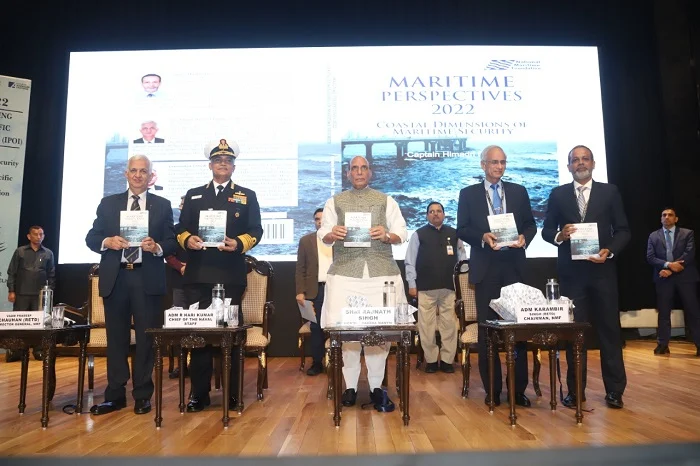

Defence Minister Rajnath Singh at the Indo-Pacific Regional Dialogue (IPRD) in New Delhi on Friday (Image courtesy: National Maritime Foundation)
India on Friday reiterated that it stands for a free, open and rules-based Indo-Pacific as it is important for the economic development of not only the region but also the wider global community.
Delivering his keynote address at the Indo-Pacific Regional Dialogue (IPRD) in New Delhi, Defence Minister Rajnath Singh spotlighted India’s vision of the Indo-Pacific by quoting Prime Minister Narendra Modi’s statement during the Shangri-La Dialogue in Singapore in June 2018.
“The Prime Minister had said that India stands for a free, open and inclusive Indo-Pacific region, which embraces us all in a common pursuit of progress and prosperity. He put forth our idea of ASEAN centrality in the region and said that our common prosperity and security require us to evolve, through dialogue, a common rules-based order,” said Singh.
Singh also reiterated that India does not believe in a world order where few are considered superior to others.
“Realpolitik cannot be the fig leaf for being immoral or amoral. Rather, enlightened self-interest of nations can be promoted within the framework of strategic morality, which is predicated on the understanding and respect for the legitimate strategic imperative of all the civilised nations.
“It is for this reason that when we partner any nation, it is on the basis of sovereign equality and mutual respect. Forging relations comes naturally to India as we work towards mutual economic development. It is thus apt that we all explore solutions to the problems such as terrorism & climate change that transcend national boundaries,” he mentioned.
Citing PM Modi’s “today’s era is not of war” comment made during his meeting with Russian President Vladimir Putin at the SCO Summit in Smarkand this September, the Defence Minister said that the message was echoed by the world leaders during the G-20 Summit in Bali with the communique mentioning that ‘now is not the time for war’.
“In the times when humanity is facing problems like climate change, Covid-19 pandemic and widespread deprivation, it is essential that we all work together to surmount these mammoth challenges, without being distracted by the destructive seduction of wars and conflicts,” he said.
Singh described enhancing trade and connectivity, capacity building and infrastructural initiatives as time-tested ways of working together, which can act as bridges of friendship and ensure mutual benefit. He stressed the need to leverage them collectively for the common good.
He also emphasised that it has always been India’s endeavour to work with its partners in constructive engagements in the Indo-Pacific region with efforts like the ‘Indo-Pacific Ocean Initiative’ which outlines a regional cooperative structure, focusing on the vision of SAGAR, that is Security and Growth for All in the Region.
Having just returned from the India-ASEAN Defence Ministers’ Meeting held in Cambodia earlier this week, Singh also listed the India-ASEAN initiatives, including recruiting women in UN peacekeeping operations and working on marine plastic pollution response towards improving the marine ecosystem.
Singh termed it as a moral responsibility to strive towards building a secure and just world.
“In India, our philosophers and visionaries have always dreamt of a human community, transcending political borders. We have always seen security and prosperity as a collective pursuit of entire humankind, in which there is no possibility of island security or prosperity,” he said.
“National security should not be considered as a zero-sum game. We should strive to create a win-win situation for all. We should be guided by enlightened self-interest which is sustainable and resilient to shocks. Strong and prosperous India would not be built at the cost of others, rather, we are here to help other nations realise their full potential,” he added.
The three-day IPRD is an annual apex-level international outreach of the Indian Navy that seeks to foster exchange of ideas and promote deliberations on maritime issues relevant to the Indo-Pacific which, for India, stretches over a vast, predominantly maritime expanse from the eastern shore of Africa to the western shore of the Americas.
The event witnessed active participation from senior officials from the Indian Armed Forces, Ministry of Shipping, Ministry of Environment, Forest and Climate Change, senior representatives from Indian industry, diplomatic representatives from missions in India, academia, eminent scholars and experts from abroad. In addition, about 2,000 uniformed personnel and veterans, eminent citizens and students from renowned universities in Delhi-NCR attended the event over the three days.
Also Read: After restoring Angkor Wat, India now bringing back tigers to Cambodia
Cyprus President Nikos Christodoulides said he and Prime Minister Narendra Modi discussed expanding bilateral ties…
Prime Minister Narendra Modi said on Monday that India and Cyprus will develop a strong…
The European Union and China conducted the 40th iteration of their Human Rights Dialogue on…
Prime Minister Narendra Modi was awarded the Grand Cross of the Order of Makarios III…
External Affairs Minister S Jaishankar held a telephonic conversation with his UAE counterpart Sheikh Abdullah…
India continues to maintain an edge over Pakistan in nuclear capabilities, with the Stockholm International…